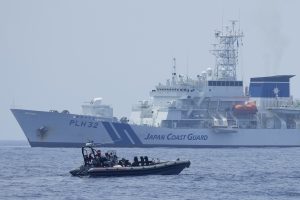U.S., Japanese, and Philippine coast guard ships staged law enforcement drills in waters near the disputed South China Sea on Tuesday as Washington presses efforts to reinforce alliances in Asia amid an increasingly tense rivalry with China.
Witnessed by journalists onboard a Philippine coast guard patrol boat, the BRP Cabra, the drills focused on a scenario involving the interdiction and boarding of a vessel suspected of carrying weapons of mass destruction off the Bataan Peninsula, Philippine coast guard spokesperson Commodore Armand Balilo said.
Shots rang out as heavily armed coast guard personnel rapidly boarded the vessel from a speedboat and herded the crew members toward the stern. A helicopter hovered as U.S. and Japanese coast guard ships helped rescue crew members who jumped off the target vessel during the mock assault.
“We are not just all display,” Philippine coast guard deputy spokesperson John Ybanez said. “All these exercises that we do will help us help each other in possible scenarios in the future.”
The U.S. Coast Guard deployed one of its most advanced cutters, the 418-foot (127-meter) Stratton, in the June 1-7 exercises hosted by the Philippines, Washington’s oldest treaty ally in Asia. The Stratton has been conducting exercises in the region to share expertise in search and rescue and law enforcement, the U.S. Coast Guard said.
“This first trilateral engagement between the coast guards of these nations will provide invaluable opportunities to strengthen global maritime governance though professional exchanges and combined operations,” the Stratton’s commanding officer, Captain Brian Krautler, said at the start of the exercises. “Together we’ll demonstrate professional, rules-based standards of maritime operations with our steadfast partners to ensure a free and open Indo-Pacific.”
Japan deployed a large coast guard ship, the Akitsushima, while four Philippine coast guard vessels joined the exercises.
The Biden administration has been strengthening an arc of military alliances in the Indo-Pacific to better counter China, including in the South China Sea and in any future confrontation over Taiwan, the self-governing island that Beijing regards as a Chinese province.
Washington lays no claims to the strategic South China Sea, where China, the Philippines, Vietnam, Malaysian, Taiwan, and Brunei have been locked in tense territorial stand-offs for decades. But the United States says freedom of navigation and overflight and the peaceful resolution of disputes in the busy waterway are in its national interest.
Philippine officials say such joint exercises with U.S. forces do not target any country. But China has warned that increased U.S. security deployments in Asia target Beijing’s interests and undermine regional stability.
The U.S. Pacific Command said over the weekend that a U.S. guided-missile destroyer and a Canadian frigate were intercepted by a Chinese warship in the Taiwan Strait. The Chinese vessel overtook the American ship and veered across its bow at a distance of 150 yards (about 140 meters) in an “unsafe manner,” it said.
Last month, the U.S. Indo-Pacific Command said a Chinese J-16 fighter aircraft flew directly in front of a U.S. Air Force RC-135 plane in an “an unnecessarily aggressive maneuver” while the American reconnaissance plane “was conducting safe and routine operations over the South China Sea in international airspace, in accordance with international law.”
In April, Japan adopted a new five-year ocean policy that calls for stronger maritime security, including bolstering its coast guard’s capability and cooperation with the military. It cited a list of threats, including repeated intrusions by Chinese coast guard ships into Japanese territorial waters.
The Philippine coast guard, meanwhile, has intensified patrols in the South China Sea and taken extra efforts to document and publicize assertive Chinese behavior in the waterway following a February 6 incident in which a Chinese coast guard ship aimed a military-grade laser that briefly blinded some crew members on a Philippine patrol boat off a disputed reef.

































